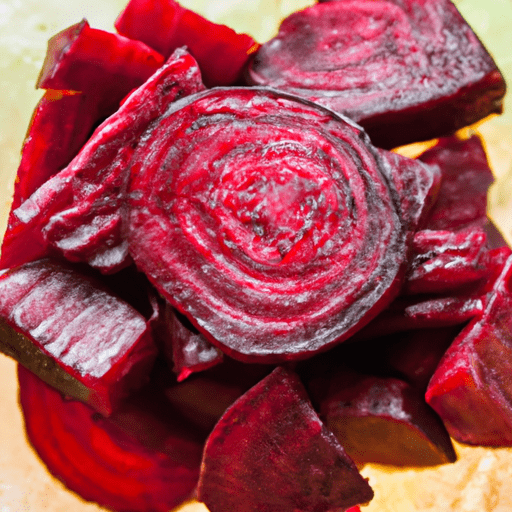The Wonderful World of Pickled Beets
Pickled beets are a vibrant and savory delight that have been gracing tables around the world for centuries. With their striking ruby hues and tangy flavor, these tangy roots are a versatile ingredient that can add a punch of flavor to a variety of dishes. Whether you’re a beet enthusiast or a curious foodie looking to explore new flavors, pickled beets are a must-try culinary delight.
A Taste of Tang and Earthiness
When it comes to taste, pickled beets offer a unique combination of tanginess and earthiness. The pickling process infuses the beets with a tangy vinegar and sweet-sour brine, perfectly balancing the natural sweetness of the vegetable. Each bite delivers a burst of flavor that tantalizes the taste buds. The earthy undertones of beets are elevated through the pickling process, creating a delightful contrast that keeps you coming back for more.
Elevating Your Culinary Creations
Pickled beets can be enjoyed in countless delicious ways. Their versatility allows them to shine in both savory and sweet dishes, adding depth and excitement to each creation. Here are a few common uses of pickled beets:
Salads
One of the most popular ways to enjoy pickled beets is in salads. The vibrant color and tangy flavor provide a refreshing contrast to leafy greens and creamy dressings. Toss pickled beets with baby spinach, crumbled feta, and a drizzle of balsamic dressing for a salad that bursts with flavors and textures.
Sandwiches and Wraps
Add a zing to your next sandwich or wrap by layering on some pickled beets. Their tanginess cuts through the richness of meats and cheeses, creating a perfect balance of flavors. Pair pickled beets with roasted turkey, fresh arugula, and a smear of creamy goat cheese for a satisfying and flavorful sandwich.
Appetizers and Charcuterie Boards
Pickled beets are the ideal addition to any appetizer spread or charcuterie board. Their vibrant color adds visual appeal, while their tangy flavor complements an array of cheeses, cured meats, and crackers. Serve pickled beets alongside creamy goat cheese, crusty bread, and thinly sliced prosciutto for an appetizer that is as beautiful as it is delicious.
Relishes and Chutneys
Transform ordinary condiments into extraordinary ones with the addition of pickled beets. Finely chop pickled beets and blend them with onions, apples, and spices to create a vibrant relish or chutney. This versatile accompaniment pairs well with roasted meats, grilled vegetables, or even as a spread for sandwiches and burgers.
Nutritional Superstars
In addition to their wonderful flavor, pickled beets also pack a nutritional punch. These vibrant roots are a great source of essential vitamins and minerals. They are rich in fiber, potassium, and folate, making them a nutritious addition to any diet. Furthermore, the pickling process preserves many of these nutrients, ensuring that they remain intact and ready to fuel your body.
A Historical Delicacy
The tradition of pickling beets can be traced back to ancient times. The Ancient Romans and Greeks valued the preservation properties of vinegar and used it to pickle a variety of vegetables, including beets. Throughout history, pickled beets have been cherished for their ability to provide sustenance during long winters, when fresh produce was scarce. Today, the popularity of pickled beets continues to grow, as people appreciate their unique taste and versatility in the kitchen.
Pickled beets are a culinary treasure that offer a burst of tangy and earthy flavors. From salads to sandwiches, their versatility in the kitchen knows no bounds. Not only do they elevate the taste of your dishes, but they also provide a wealth of nutritional benefits. Whether you’re a beet aficionado or a curious foodie, pickled beets are a delightful addition to any meal. So go ahead, pick up a jar or embark on your own pickling adventure, and experience the wonderful world of pickled beets for yourself.
Pickled Beets
Origin: Beets have been cultivated for thousands of years, with the exact origin being uncertain. However, it is believed that they were first grown in the Mediterranean region. The process of pickling beets likely originated in Europe, where it became a popular preservation method.
Common uses: Pickled beets are often enjoyed as a side dish or added to salads. They can also be used as a topping for sandwiches or burgers. Additionally, they can be blended into dips or spreads, or incorporated into various recipes such as soups and stews.
Nutritional benefits: Pickled beets are a nutritious addition to meals. They are an excellent source of fiber, which helps support digestion and promotes satiety. They also contain important minerals such as potassium, which is essential for heart health, and folate, which plays a role in cell growth and development. Additionally, pickled beets provide vitamins such as vitamin C, which acts as an antioxidant, and manganese, which contributes to bone health.
Unique properties: Pickled beets have a distinct tangy and slightly sweet flavor that sets them apart from fresh beets. Through the pickling process, the beets absorb the flavors of the vinegar and spices used in the brine. The pickling process also gives them a vibrant color, making them visually appealing.
Historical significance: Pickling has long been used as a means of food preservation, allowing people to enjoy fruits and vegetables out of season. Pickled beets became popular in Europe during the Middle Ages and Renaissance, as they provided a way to store and enjoy beets throughout the year. Today, pickled beets continue to be enjoyed as a versatile and flavorful food.




Use the share button below if you liked it.
It makes me smile, when I see it.